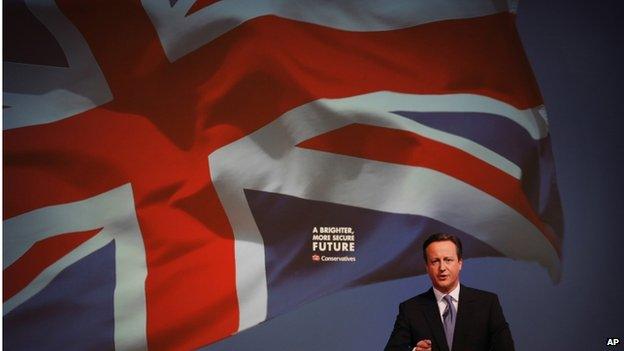Taxing times for evel proposals
- Published

Let's talk EVEL. Note the spelling. We are dealing here with English Votes on English Laws. Specifically, in this instance, elements of financial provision.
A considerable controversy has arisen over this issue as presented in the Conservative manifesto. Labour's Jim Murphy says that the plan set out by the Tories is "a brutal betrayal of the consensus" achieved in the cross-party Smith Commission.
It is, also according to Mr Murphy, a "desperate and craven attempt by the Tories to win the UKIP vote". He added that it would be "bloody awful for Scotland."
So just what is this proposal which has aroused such ire? It builds upon the plan - agreed by Smith and advanced by the Scots Tories - for control of income tax rates and bands to be devolved to the Scottish Parliament. The Conservative promise in their manifesto that they would implement Smith - and that right speedily.
But they add that added clout for Holyrood adds to the "manifest unfairness" by which Scotland decides its own affairs in devolved issues - yet continues to despatch MPs to Westminster to decide, among other things, English matters.
Their solution is to give English MPs a "veto over matters only affecting England" - or MPs from England and Wales to deal with matters affecting… (you're ahead of me) England and Wales.

Much of the terminology in the Tory manifesto is borrowed from past and present treatment of Scots Law, at Westminster and now at Holyrood.
Under the Tory plan, a Committee would be formed from English or English and Welsh MPs, as relevant, with members selected in proportion to party strength in those nations. They would consider the detail of measures affecting only England or England/Wales.
Then it is proposed that there would be a new stage added to Commons consideration whereby no measure would be able to pass to Third and final Reading without a Legislative Consent Motion, as per Holyrood, from a Grand Committee made up of all English or all English/Welsh MPs.
This principle would include the allocation of spending in England - and the formulation of an English Rate of Income Tax.
Labour's argument is three-fold. Firstly, that this system is inherently unstable - in that the totality of spending is determined by all UK MPs while, in practice, the bulk of taxation is determined by English MPs.
Secondly, that it creates two classes of MPs. Jim Murphy says he will fight to block a system which would "lock Scottish Labour MPs out" of the consideration of UK income tax.
Mr Murphy says that the plan would "rip up a centuries UK income tax system". I put it to him that that ship sailed when Scotland first gained limited and then, as proposed, substantial tax powers.
Not so, he says. It was envisaged by Smith that there would continue to be a UK system of income tax - which determined public spending in England and, via Barnett, in Scotland.
Third Reading
In response, the Tories adamantly deny that they are betraying Smith. They say that there are many elements of the tax system which will continue to be shared - such as the starting personal allowance and tax on savings. These would be subject to votes by all UK MPs.
Further, they say the final decision on the Budget would be a Third Reading where, again, all MPs would be involved.
I put it to the Tories that would be a Budget whose provisions had been pre-filtered by English MPs, acting alone. Exactly, say the Conservatives, as is proposed in the plan to devolve income tax rates and bands to Scotland.
One senior Tory strategist told me: "What exactly did Labour think would be the consequences when they signed up to Smith and tax powers for Scotland?"
Annabel Goldie, who represented the Tories on Smith, says that Jim Murphy is seeing demons where none exist. The Tories, she insists, are implementing Smith - and its consequences. Not abandoning it.
Politically, Mr Murphy says this is a Tory attempt to out-manoeuvre UKIP. The Tories reply that it is elementary equity.
The SNP, of course, favour a situation whereby there would be no representation from Scotland at Westminster at all - in that Scotland would be independent. As an interim, Nicola Sturgeon argued today that her party would press for modest increases in spending in the Parliament ahead.
Willie Rennie of the Liberal Democrats argued today that the Tories were out to inflame the constitutional debate - thus talking up the SNP. His contention is that the Tories hope thereby to unseat LibDem and, especially, Labour MPs in Scotland - to benefit the Conservatives in the UK calculation.
That has been discounted by other parties.